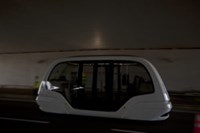
2getthere’s newly developed prototype of a Group Rapid Transit (GRT) autonomous vehicle has this month seen its first operational test in simulated desert climate conditions. It was subject to three tests in weather conditions such as ‘hot dry’ and ‘hot humid’, with a focus on the performance of the air conditioning system at the vehicles’ maximum (24) passenger capacity. The test results show that the battery-powered vehicles are able to maintain an indoor temperature of 23˚C even in the worst-case scenario (52˚C outside temperature and 3% humidity). The extreme climate test is one in a long line of tests regarding the mega order the Utrecht-based company received from the United Arab Emirates earlier this year. From 2020, 25 vehicles will perform fully autonomous shuttle services to and from Bluewater Island in Dubai.
The simulated weather conditions during the test included extremely high temperatures and sun radiation. Both are common in Dubai, with average peaks in sun radiation of 1,040 Watts per square metre around noon and peaks in temperature of 52˚C around 3.30pm. In the climatic chamber, both peaks were simulated at the same time, the most extreme scenario and one that is highly unlikely to ever become reality.
The passengers (16 standing passengers representing 120 Watts each and eight seated passengers each representing 100 Watts) were simulated by placing a 3000-Watt heat source inside the vehicle. A vital part of the test focused on performance during transition: the speed at which indoor conditions are brought back to the most comfortable level for passengers after the doors close and the vehicle starts its journey. The most extreme situation tested was based on the vehicle standing still with the doors opened for six minutes. In actual circumstances much shorter stops will suffice to allow 24 passengers to enter the vehicle and find their places. Moreover, these stops will normally happen at an air-conditioned station environment.
Performance Exceeds Specifications
The air conditioning system for the new generation GRT was developed in close collaboration with suppliers DC Airco and NLR (Netherlands Aerospace Centre). NLR has used the simulation of heat management in relation to airflow within the vehicle in its design of the air conditioning. The results of the climatic chamber test exceed all expectations based on 2getthere’s specifications. The development of the air conditioning system was partly financed with an MIT research grant from Utrecht province in which DC Airco and 2getthere have participated together.
According to 2getthere the successful climate test marks yet another step towards the operational deployment of the system, which has been scheduled for 2019/2020.
About 2getthere.png)
2getthere realizes Automated Transit Systems for Smart Cities. The technology is based on 25+ years of experience with automated vehicles in various demanding environments. Depending on the requirements and configuration of the application, 2getthere’s driverless vehicles can used to realize Automated People Mover Systems, Automated Transit Networks and Shared Autonomous Vehicles.




Comments
There are no comments yet for this item
Join the discussion